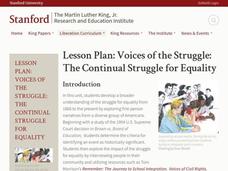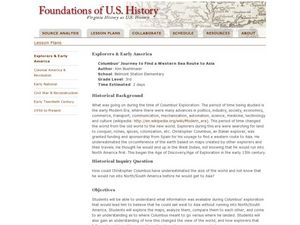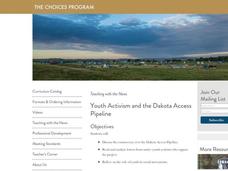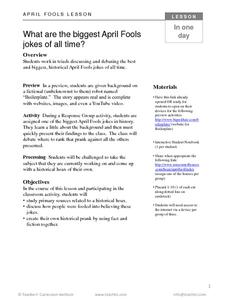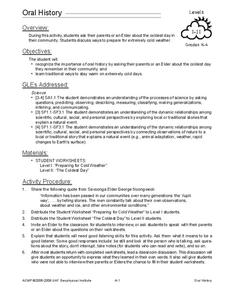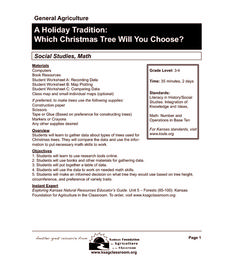Museum of Tolerance
The Role of Citizens in a Participatory Democracy
Groups research participatory democracies and compare the role and rights of citizens in ancient history with those in recent U.S. history. Guided by a series of questions, individuals compose a persuasive essay in which they discuss the...
American Psychological Association
Facebook Activity
Imagine if Sigmund Freud or Charles Darwin had a Facebook page. As part of a study of major historical figures in the field of psychology, class members are assigned a psychologist and design a mock Facebook page that includes such items...
Stanford University
Voices of the Struggle: The Continual Struggle for Equality
As part of a study of the Civil Rights Movement from 1868 to the present, class members examine first person narratives, the Supreme Court case Brown v. Board of Education, and other significant events in civil rights history. They then...
Curated OER
Explorers & Early America: Columbus' Journey to Find a Western Sea Route to Asia
Third graders study Columbus and the route he took when he was exploring. In this social science, 3rd graders examine maps, analyze them, compare them to each other, and understand where Columbus wanted to go versus where he actually...
Brown University
Youth Activism and the Dakota Access Pipeline
Do young people have a role in social movements? Should they? The involvement of young people in the Dakota Access Pipeline is the focus of a resource that asks class members to examine letters written by native youths who oppose the...
Constitutional Rights Foundation
Why Don’t More People in the U.S. Vote?
To vote or not to vote, that is the question. Secondary scholars explore voter turnout in the United States. The resource uses informational text, group discussion, and a worksheet to help academics understand hindrances to voting and...
Constitutional Rights Foundation
Suppressing the Vote
Voting rights have expanded over time, but some voters are still being suppressed. A thought-provoking resource explores the history of voter suppression in the US and efforts to remove roadblocks to voting. Young historians learn about...
TCI
What Are the Biggest April Fools Jokes of All Time?
After working in groups to analyze primary sources related to a historical hoax, learners will discuss how people managed to be fooled and work to identify one of the biggest April Fools jokes in history.
Curated OER
Social Class, Social Change, and Poverty
Students begin to explore poverty and its implications on society and future generations. They should have had experience with identifying social change that happens gradually and social change that happens quickly because of natural...
Constitutional Rights Foundation
Special Order 40
The city of Los Angeles' 1979 Special Order 40 states: "LAPD officers shall not initiate police action with the objective of discovering the alien status of a person." After reading a fact sheet that details the history of Special Order...
Constitutional Rights Foundation
U.S. Immigration Policy and Hitler’s Holocaust
Though the Statue of Liberty welcomes political refugees to her shores, the welcoming sentiment has not always been reflected in the American citizenry. High schoolers read about the regrettable period in United States history when the...
Curated OER
HISTORY OF SCIENCE: ASTRONAUTS
Students study the pioneers of space exploration and travel; identify some of the early astronauts who prepared the way for others; examine the social and political conditions at the dawn of the Space Age; and differentiate among space...
Curated OER
Disease & Epidemics: Architects of History
Students explore disease and its relationship to history and literature. They investigate issues that range from early biological warfare and historical disease treatments, to observing today's race for the cure against current emerging...
Stanford University
Ruby Bridges
A two-part lesson features Civil Rights hero, Ruby Bridges. Part one focuses on the heroic actions of Ruby Bridges then challenges scholars to complete a Venn diagram in order to compare themselves to her. Part two begins with a...
Minnesota Department of Natural Resoures
Minnesota’s Forests
The forests of Minnesota provide middle schoolers with an integrated learning opportunity. They examine the three biomes and their histories, conduct experiments, read stories, and draw pictures. A lovely lesson about trees.
Curated OER
Oral History
Students interview a Native Elder to learn about oral history and cold weather. In this weather activity, students ask an Elder about the coldest day they remember in their community and complete two worksheets for the topic.
Curated OER
Flood Control: Environmental History
High schoolers examine the painting, Spring on the Missouri. They role-play and discuss floods and flood control from the views of an environmental lobbyist and a farmer.
Agriculture in the Classroom
A Holiday Tradition: Which Christmas Tree Will You Choose?
Different varieties of Christmas trees provide an interesting way to combine social studies, science, math, and technology. Class members not only research the history of the Christmas tree holiday tradition, they compare and contrast...
National Park Service
Leave it to Beavers
Many people know cats mark their territories by rubbing the back of their necks to leave a scent, but not many people know beavers also leave a scent to mark their territories. During the first activity of two, scholars use their noses...
Channel Islands Film
Magic Isle: Lesson Plan 1
What are the factors that limit growth and expansion? As part of their study of Catalina Island, class members view the West of the West's documentary Magic Isle and research William Wrigley and the Santa Catalina Island Company. After...
Council for the Curriculum, Examinations and Assessment
Victorian Historians
Take the class back in time to the Victorian Era! The resource provides a plethora of activities that create experiences for scholars in class. Some activities include a fun fair, viewing the starry-night painting, and even experiencing...
Curated OER
Working in Photographs
Students analyze illustrations of workers in the 19th and 20th centuries. For this social science lesson, students examine photographs of workers and identify the types of work that were available in the 19th century compared to the 20th...
Constitutional Rights Foundation
Guest-Worker Program
The U.S. Guest-Worker Program and the H-2A visa are the focus of a social studies activity. First, class members assume the role of advisors who must present the president with four proposals that would amend the visas given to...
California Polytechnic State University
Australian Geography Unit
At the heart of this resource is a beautifully detailed PowerPoint presentation (provided in PDF form) on the overall physical geography of Australia, basic facts about the country, Aboriginal history, and Australia culture and lifestyle.




